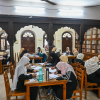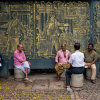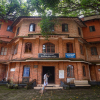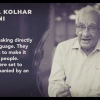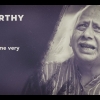Question: Where do you think the relevance of Comparative Literature lies vis-a-vis the socio-cultural context of India?
Rizio Yohannan Raj: Modern India as an integrated socio-cultural entity is a fantasy that we are still desperately attempting to negotiate. We must wake up to the fact that our country presents a curious situation that demands a governance genius capable of effecting a fine balance between its federal constitution and its multi-dynamic community cultures. I would say, our efforts in the second quarter of the 20th century to create a nationalistic discourse to counter colonial power were a necessity of history. It would not help now to wallow in any ineffectual criticism of that century-old moment that chose to interpret our diverse literary and cultural expressions in a rather linear manner. Nor would it be of any use to continue on the same track of homogenisation when we can choose to discover our country’s non-linear potential. It is high time we created a space where cultural plurality can be experienced and understood as a unique strength of India and not as a threat to anyone’s political aspirations. I think the relevance of Comparative Literature in these times in India is that it provides the maximum ground and conditions for the development of a transformative field of knowledge on the Indic cultural matrix. If we are able to reflect on this space and develop it with this degree of openness, it could play a seminal role in the pluralistic blossoming of the country and its people in our times.
Q.: How would you locate the factors that led you to the disciplinary practice of Comparative Literature?
R.Y.R.: My study of English Language and Literature at the University for five years left me with a double-edged sword of ignorance. On the one hand, I ended up with no clue about the place and people that generated the literature that I spent so much time to study, and on the other, my academic practice as a young person was completely cut off from the creative history of my own immediate context. Apparently, I knew more about the English Romantic poets than I knew about the contemporary writers in Malayalam. But, I realised my knowledge had only apparent value—it had no true value as long as I did not understand what prompted me to spend my time and energy in the study of a certain literature. That line of thought led me to go to the intersections of literature and other disciplines to understand sensitivity—personal, social, political, cultural, ecological, spiritual—as the core of literary cultures across languages, time and space. Then it was inevitable that an academic space was created to reflect on a methodology to nurture this sensitivity. And, my explorations told me that this methodology has to necessarily be concerned with the border spaces in literature, and has to remain renewable in its very orientation.
Q.: How would you respond to the formation of curriculum and the institutionalization of Comparative Literature in and from your location?
R.Y.R.: My own practice of Comparative Literature as a discipline works in three streams. First, I see comparative literature primarily as a literary field with its emphasis on the ‘word’, and hence attempt to create a methodology for literary studies. My attempt is to reveal how in India we have the opportunity to create a way that transcends the shallow surveys of American-style World Literature as well as the limitations of the early European textual analysis. The curriculum should be able to negotiate these two, and build on their strengths and create research-oriented courses as well as deep historical enquiries that are founded on the principles of thematology, genology, literary historiography, translatology and the like.
Secondly, Comparative Literature must include in its discourse an appreciation on how other fields and disciplines contribute to the making of literature on the one hand, and how this cumulative influence on literature helps the latter to become a significant shaping force for our societies. This means supplementary channels must be open for the students to gain exposure to other related fields.
Thirdly, I personally use translation and ‘translatology’ as fields of connection that help achieve the ends of comparative inquiry. I think, in India, the institutionalisation of Comparative Literature as different from that of Cultural Studies can be made only by understanding and engaging with translation in a practical as well as discursive manner.
My edited volume Quest of a Discipline: New Academic Directions for Comparative Literature tries to make an attempt in the above directions, and understands CL as a field that is always questing, rather than a discipline that seeks to define its boundaries.
Q.: How do you wish to incorporate the teaching of Indian Literature in the discipline of Comparative Literature?
R.Y.R.: I think, the homogenous idea of Indian Literature is something that we must resist and overcome. Literature in India is a multi-centred whole like the navagraha installation found in the Indic cultural matrix. There has to be a simultaneous understanding of the local as well as translocal dynamics and interlinkages of our languages and literatures. That is why we need to develop the field of translation—not as a functional exercise, but as a realm of knowledge that would provide us with a great deal of insight into how to deal with literatures in India, and study them systematically. We need to develop academic platforms and courses that take this question seriously. For instance, the study of Bhakti poetry in India must necessarily be brought under CL, as the Bhakti poets give us brilliant methods of translating spontaneously not only from one language to another, but across cultures.
Q.: How do you envisage the future of Comparative Literature?
R.Y.R.: I think the future of Comparative Literature in India is not in the academic departments of our existing schools and universities. It is in the bare hands of our young people who are keen on freely exploring the border regions of languages, cultures, and regions. The future lies latent in those transit lounges where big dreams are dreamt and transformation is brewed. The Academy must learn from our societies, and the lives of people and their true histories, rather than expecting some glorious future to walk into the pre-fabricated machinery of disciplines and reveal itself.

